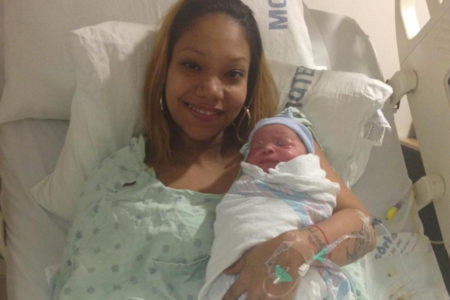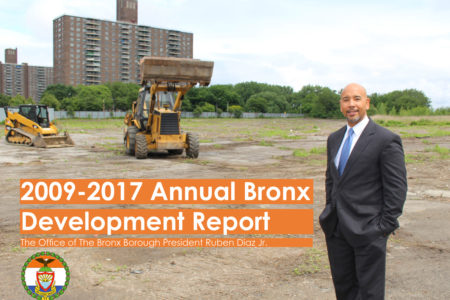Whether it’s a first-grader’s after-school activities or her parents’ night out watching dance downtown, many nonprofit programs central to City life are struggling.
The demand is there, but the funding is tight. “Food pantries have lines around the block and free summer youth programs have waiting lists,” says Joyce Bove, senior VP of grants and special projects at The Trust. “In light of the severe State and City budget cuts, we are helping these groups do the most with what they’ve got, but there’s no doubt that City groups need charitable New Yorkers more than ever.” The Trust makes grants five times a year with the next round announced in June.
Healthy, Affordable Food In All Five Boroughs
In the first year of Healthy Food, Healthy Communities, a program to help elders become leaders in bringing healthy food to their neighborhoods, 100 seniors and 25 young people brought 25 tons of good, affordable food to Washington Heights, East New York, and Fort Greene; seniors also led more than 30 healthy cooking classes.
The following grants continue to support these projects and expand to three new sites in the Bronx, Queens, and on Staten Island: United Neighborhood Houses of New York, $123,000; Isabella Geriatric Center, $70,000; Myrtle Avenue Commercial Revitalization and Development Project, $70,000; BronxWorks, $70,000; Queens Community House, $70,000; and Just Food, $70,000. The Trust will also continue supporting the Food Bank for New York City with a $700,000 grant to help poor people get food stamps and other benefits.
Helping Nonprofits Survive
Local Initiatives Support Corporation, $70,000 to help community development corporations (CDCs) manage their real estate portfolios; Neighborhood Opportunities Fund, $50,000 for financial management assistance to CDCs; Community Resource Exchange, $200,000 to provide management consulting to clusters of nonprofits in poor neighborhoods; and Lawyers Alliance for New York, $500,000 for a joint effort with Cause Effective and the Nonprofit Finance Fund to provide a range of management support for nonprofits dealing with cuts in public funding.
Keeping Toxic Chemicals At A Safe Distance
Center for International Environmental Law, $75,000 to promote chemical safety through international and domestic regulations; Clean Water Fund, $75,000 to organize and advocate for healthier drinking water throughout the United States; Coming Clean Collaborative, $75,000 to test products for chemical toxicity and publicize the inability of the Toxic Substances Control Act to protect public health; Healthy Building Network, $75,000 to promote safer building materials; Healthy Schools Campaign, $75,000 to advocate for green cleaning and healthier environments in schools nationwide.
More Environmental Grants
Connecticut Fund for the Environment, $60,000 to build public support for a plan to restore the health of the Long Island Sound; Farming Concrete, $49,000 to measure the capacity of community gardens to feed local residents. Friends of the Earth, $75,000 to advocate for reduction in federal subsidies for coal, oil, and natural gas producers; Lower East Side Ecology Center, $50,000 to open a computer re-use and recycling center in Brooklyn; Wildlife Conservation Society, $75,000 to create migration corridors and other methods of helping wild animals adapt to climate change; and Queens Botanical Garden, $40,000 for a marketing campaign to attract visitors.
Arts And Historic Preservation
Alliance for the Arts, $40,000 for a study on the economic impact of the arts in the City; Artspace, $50,000 to convert a historic school building in East Harlem into affordable live/work space for artists and office space for nonprofit arts groups; and National Jazz Museum in Harlem, $40,000 to preserve a collection of live jazz radio broadcasts from the 1930s and 40s.
Making Sure All Our Kids Are Learning
University of the State of New York Regents Research Fund, $200,000 to develop student assessments and teacher evaluations that account for the progress of students with disabilities and English language learners.
Helping Immigrants
Fund for New Citizens, $150,000 for a funding collaborative that assists immigrants and refugees in the City; Sanctuary for Families, $100,000 to provide legal help to immigrant women and girls who are victims of domestic violence.
Health And People With Special Needs
Medicaid Matters New York, $50,000 to bring the consumer voice to Medicaid reform debates; Council of Senior Centers and Services of New York City, $75,000 for expansion of a money management program for frail elders; and New York State Council for Community Behavioral Healthcare, $55,000 to improve the operations of clinics licensed to provide both mental health and substance abuse treatment.
Preventing Homelessness
Bridge Fund, $910,000 to prevent people from becoming homeless by giving them emergency cash grants and money-management help.
Getting Dads More Involved
Agenda for Children Tomorrow, $50,000 to identify City policies and practices that discourage fathers’ involvement with their kids.
More After-School Programs In Harlem
Harlem Children’s Zone, $76,000 to expand after-school academic programs for young people living in the St. Nicholas and Abraham Lincoln Houses.
On Duty In Queens Public Housing
New York City Civilian Complaint Review Board, $40,000 to reduce conflict between the police and youth living in Queens public housing.
Keeping Kids Off Drugs
Outreach Project, $100,000 to help formerly drug-addicted youth stay off drugs by improving outpatient programs in Brooklyn and Queens.








